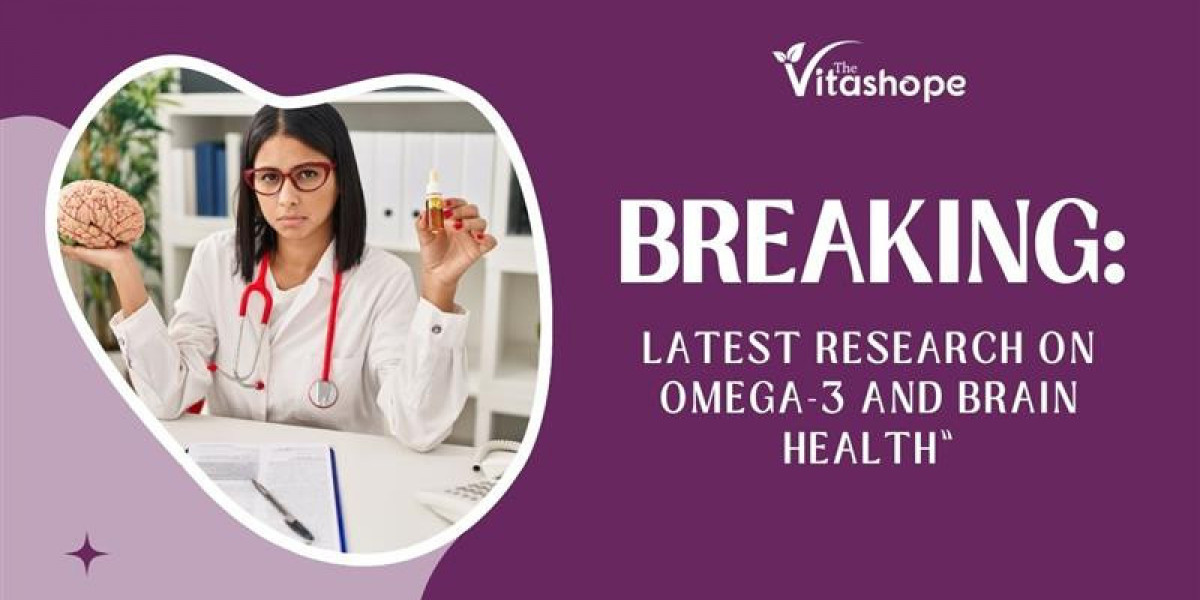Omega-3 fatty acids are essential polyunsaturated fats that the body cannot produce on its own. These nutrients must be obtained through diet or supplementation. The three main types include:
EPA (Eicosapentaenoic Acid): Supports cardiovascular and brain function, reduces inflammation.
DHA (Docosahexaenoic Acid): A key structural component of the brain and retina, crucial for cognition and vision.
ALA (Alpha-Linolenic Acid): Plant-based Omega-3 found in chia seeds, flaxseeds, and walnuts; partially converted to EPA and DHA in the body.
Despite their importance, studies show many diets fall short in Omega-3 intake, making supplementation critical for brain and overall health.
Latest Research Insights
Recent studies highlight the power of Omega-3 fatty acids in supporting brain health:
Memory and Cognitive Function: Research indicates that regular Omega-3 intake enhances memory retention, learning ability, and overall cognitive performance. DHA, in particular, is vital for maintaining neuronal health and communication.
Attention and Focus: Omega-3 supplementation has been linked to improved focus and concentration in both adults and teens, reducing mental fatigue during daily tasks.
Cognitive Decline Prevention: Older adults consuming Omega-3s show slower rates of cognitive decline and reduced risk of neurodegenerative conditions.
Mood Support: EPA has been shown to help regulate mood, reduce symptoms of depression, and improve emotional resilience.
These findings make Omega-3 supplements like Natural Omega-3 and Omega365 essential for anyone seeking long-term brain health.
Health Benefits Beyond the Brain
While Omega-3 fatty acids are critical for cognitive function, they also support overall wellness:
Heart Health: Omega-3s reduce triglycerides, improve arterial flexibility, lower blood pressure, and protect against heart disease.
Eye Health: DHA supports retinal structure and function, reducing the risk of dry eyes and age-related macular degeneration (AMD).
Anti-Inflammatory Effects: Chronic inflammation contributes to many health conditions. Omega-3s help reduce systemic inflammation and support joint and muscle health.
Mood & Mental Wellness: Regular intake can improve mood balance, reduce anxiety, and enhance overall mental resilience.
Sources of Omega-3
Omega-3s can be obtained from both dietary sources and supplements:
Omega-3 Foods:
Fatty fish (salmon, mackerel, sardines)
Chia seeds and flaxseeds
Walnuts
Algae-based products
Supplements:
Natural Omega-3 — high-quality fish oil capsules with concentrated DHA and EPA.
Omega365 — designed for optimal absorption and maximum brain support.
For individuals who struggle to get enough Omega-3 from diet alone, supplements are a practical and effective solution.
Who Should Take Omega-3?
Teens: Supports brain development, learning, and focus. Pair with Teen Multivitamin Gummies for comprehensive nutrition.
Adults and Women: Enhances memory, focus, and cognitive resilience. Pair with Multivitamins for Women for full wellness support.
Seniors: Helps maintain cognitive function, reduce inflammation, and support eye and heart health.
Omega-3 supplementation is suitable for anyone looking to optimize brain health and overall wellness.
Choosing the Right Omega-3 Supplement
When selecting a supplement, consider:
Quality & Purity: Choose products free from heavy metals, toxins, and fillers.
EPA and DHA Content: Look for formulas with clinically relevant doses.
Trusted Brands: Products like Omega365 and Natural Omega-3 are third-party tested for potency and purity.
Dosage: Typical daily intake ranges from 250–500 mg of combined EPA and DHA for general wellness; higher doses may be recommended under medical supervision.
Tips for Incorporation
Take supplements consistently with meals for improved absorption.
Combine with Omega-3 foods for maximum benefit.
Pair with multivitamins for overall wellness.
Maintain a daily routine for long-term cognitive and physical health.
Conclusion
Omega-3 fatty acids are essential for brain health and overall wellness. Research consistently shows benefits in memory, focus, cognitive function, mood regulation, heart health, eye health, and inflammation reduction. With modern diets often lacking sufficient Omega-3, supplements like Natural Omega-3 and Omega365 provide a convenient, high-quality solution. Pairing Omega-3 with Teen Multivitamin Gummies or Multivitamins for Women ensures complete daily nutritional support for individuals of all ages. Incorporating Omega-3 today is a proactive step toward long-term mental, physical, and emotional wellness.
FAQs
Q1: How does Omega-3 support brain health?
DHA and EPA maintain neuronal structure, improve communication between brain cells, and support memory, focus, and cognitive performance.
Q2: Can Omega-3 prevent cognitive decline?
Regular intake of Omega-3 has been linked to slower age-related cognitive decline and a lower risk of neurodegenerative diseases.
Q3: How much Omega-3 should I take daily for mental wellness?
A daily dose of 250–500 mg of combined EPA and DHA is recommended for general wellness, with higher doses under professional guidance.
Q4: Are Omega-3 supplements safe for teens and seniors?
Yes, age-appropriate supplements like Omega365 and Natural Omega-3 are safe and effective.
Q5: Can Omega-3 improve mood and focus?
Yes, EPA and DHA play a role in neurotransmitter function, supporting mood regulation, emotional balance, and mental clarity.








